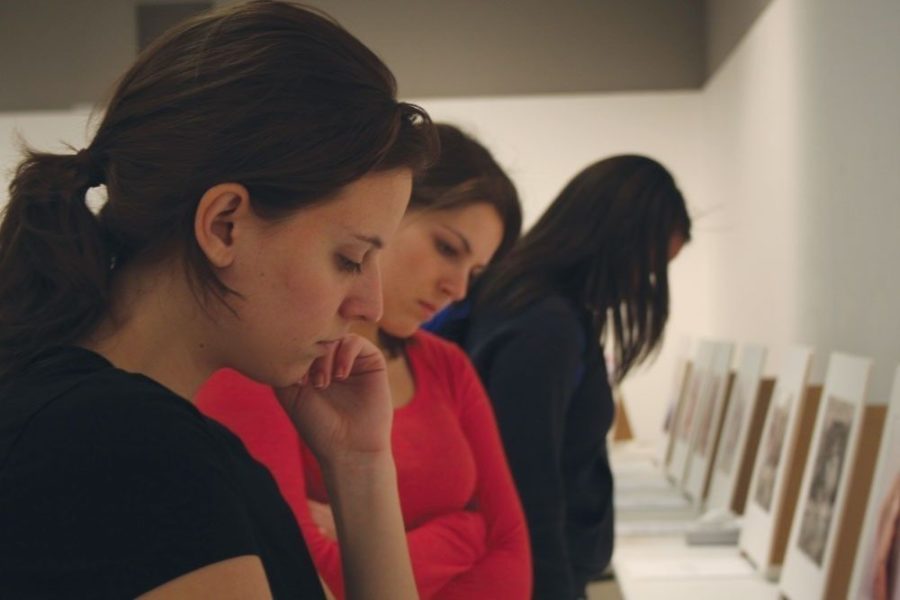The Century Project wraps up its final day at UK
Architecture seniors Jennifer Chadwick and Emily Taylor, left, view a photo in The Century Project. Photo by Quianna Lige
March 2, 2012
A century of beauty and struggles were entirely exposed this week at the Tuska Center for Contemporary Art.
During National Eating Disorder Awareness Week, The Century Project attempted to break stereotypes and inspire women to embrace their bodies as they are.
The exhibition is free to the public and runs for the remainder of Friday.
The project features nude photographs of women of various ages, backgrounds and body types, and it is open to the public.
The photographs, accompanied by personal written statements, tell the story of women who went through instances of pain and struggle, such as eating disorders and rape.
They represent the distorted social expectations women are faced with daily.
Some pieces also tell stories of humor and joy.
The photographer and founder of this exhibit is Frank Cordelle, and he is pleased, but not surprised, with the feedback he has received at UK.
“Feedback is very positive, but to be honest, it always is,” Cordelle said.
Cordelle has showcased his photographs at 65 other campuses over 25 years since The Century Project started.
Cordelle said he hopes men and women take home something different from the exhibit.
While women might feel encouraged to speak up or embrace their imperfections, men might look at women through different eyes.
“For women, it’s both enforcing and therapeutic,” he said. “I have had women come up to me after they had gone through the exhibit and said they had changed their minds about getting breast implants, for example.”
The photographer, who is at the exhibit during most of its opening hours, believes it’s a life changing experience for some.
“Most men, especially college students, might be looking at a nude photo of a woman that is not sexual for the first time,” Cordelle said.
Cordelle has photographed women of all ages from 0 to 100 years old. Beneath each photo is a statement written by the woman in the picture.
“Reading the statements is just as important as looking at the photos. It tells their story, something you’d never be able to tell just by looking at her out on the street,” Cordelle said.
Some of them volunteer after they have gone through the exhibit, Cordelle said.
Jill Kindy, a health education coordinator for University Health Service, had the idea of bringing The Century Project to campus this year.
“I work a lot with girls with eating disorders and body image issues,” Kindy said. “This promotes body acceptance, treating it nicely, and being healthy.”
In 2001, more than 1,000 people attended the exhibition and Kindy thought National Eating Disorders Awareness Week was the perfect opportunity to bring it back.
“The exhibit sparks some thought about what beauty really is,” Kindy said. “Especially for us, girls. Hopefully it will change the idea of what we perceive as flaws and we’ll learn to embrace them.”
Kindy said attendance has been fairly diverse, with a large number of men visiting the gallery.
“It’s a chance for men to look a the female body without the sexual context,” Kindy said.
Kindy encourages everyone to visit the gallery for the remaining time the photos will be displayed.
“You laugh, you cry. It’s very moving going through the exhibit,” she said.
Living a few years in Europe and adapting to their views on nudity was the start of an idea Cordelle had not yet had, he said. Then, analyzing how the American culture perceives nudity and with a hobby in photography, Cordelle decided to make a change.
“Photography played a major role in both history and social change, so I thought that’s where I wanted to go, instead of just a pretty picture,” Cordelle said.
























































































































































